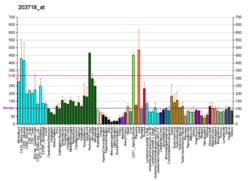| ACSM2B | |||||||||||||||||||||||||||||||||||||||||||||||||||
|---|---|---|---|---|---|---|---|---|---|---|---|---|---|---|---|---|---|---|---|---|---|---|---|---|---|---|---|---|---|---|---|---|---|---|---|---|---|---|---|---|---|---|---|---|---|---|---|---|---|---|---|
| Identifiers | |||||||||||||||||||||||||||||||||||||||||||||||||||
| Aliases | ACSM2B , ACSM2, HXMA, HYST1046, acyl-CoA synthetase medium-chain family member 2B, acyl-CoA synthetase medium chain family member 2B | ||||||||||||||||||||||||||||||||||||||||||||||||||
| External IDs | OMIM: 614359; MGI: 2385289; HomoloGene: 89289; GeneCards: ACSM2B; OMA:ACSM2B - orthologs | ||||||||||||||||||||||||||||||||||||||||||||||||||
| |||||||||||||||||||||||||||||||||||||||||||||||||||
| |||||||||||||||||||||||||||||||||||||||||||||||||||
| |||||||||||||||||||||||||||||||||||||||||||||||||||
| |||||||||||||||||||||||||||||||||||||||||||||||||||
| |||||||||||||||||||||||||||||||||||||||||||||||||||
| Wikidata | |||||||||||||||||||||||||||||||||||||||||||||||||||
| |||||||||||||||||||||||||||||||||||||||||||||||||||
Acyl-CoA synthetase medium-chain family member 2B (ACSM2B) is a mitochondrial enzyme that in humans is encoded by the ACSM2B gene. [5] [6]




